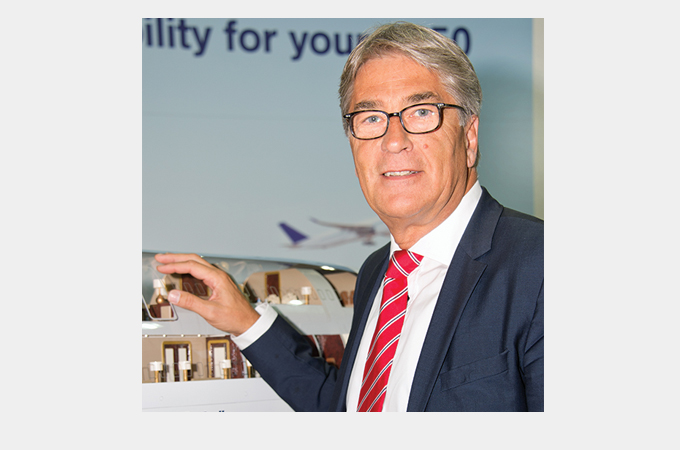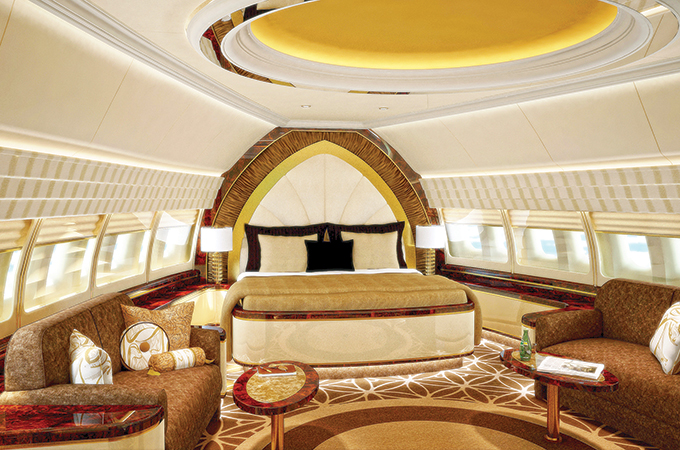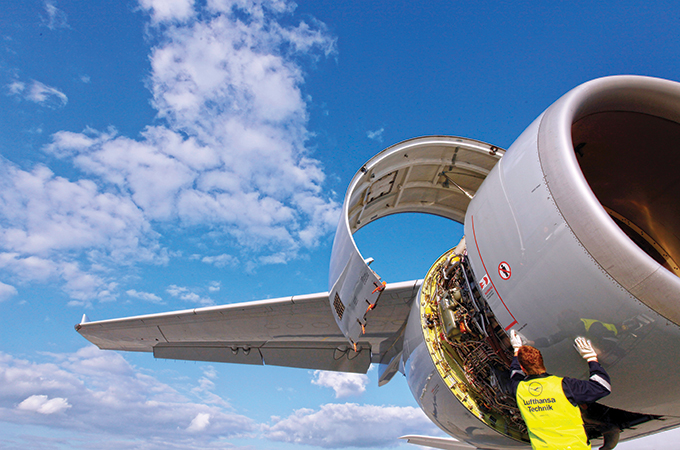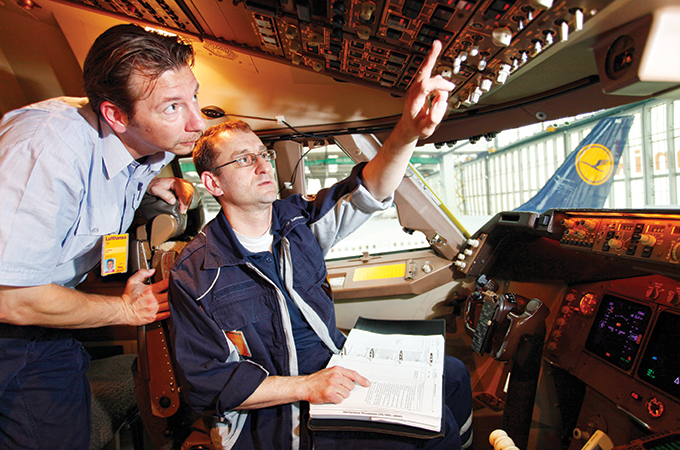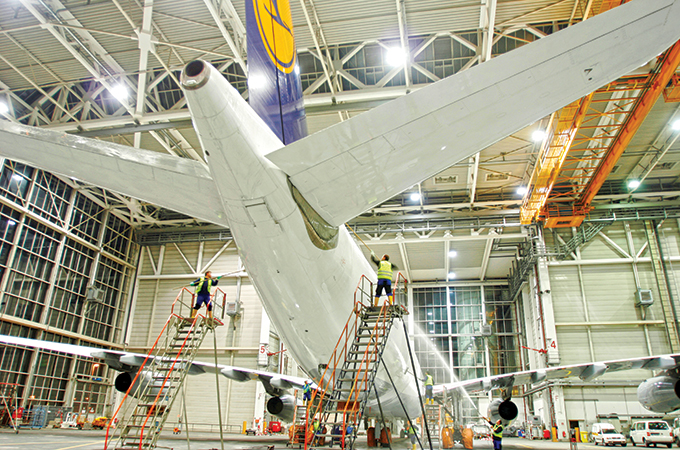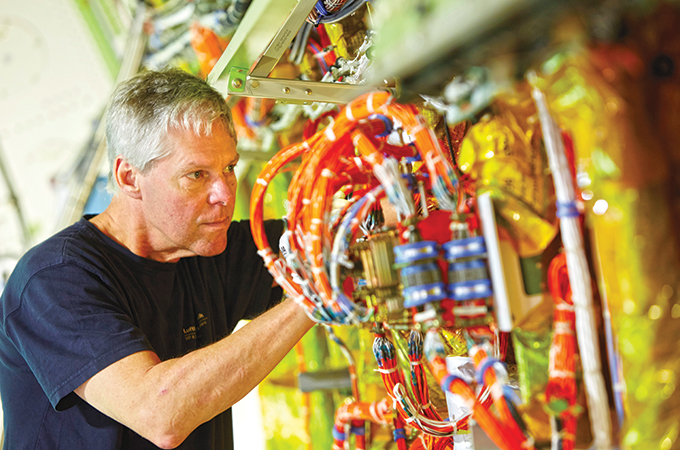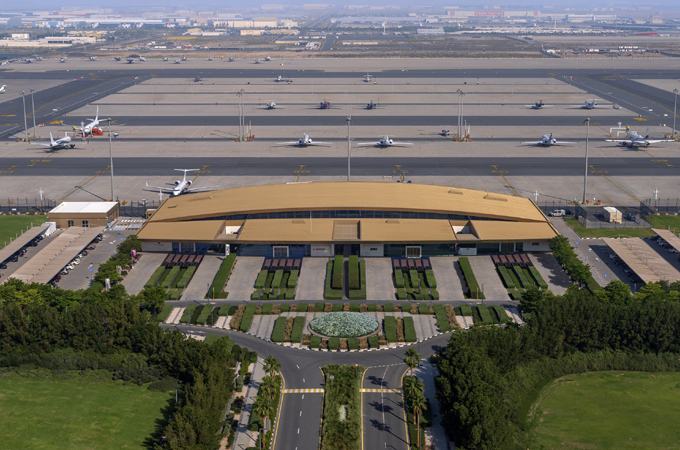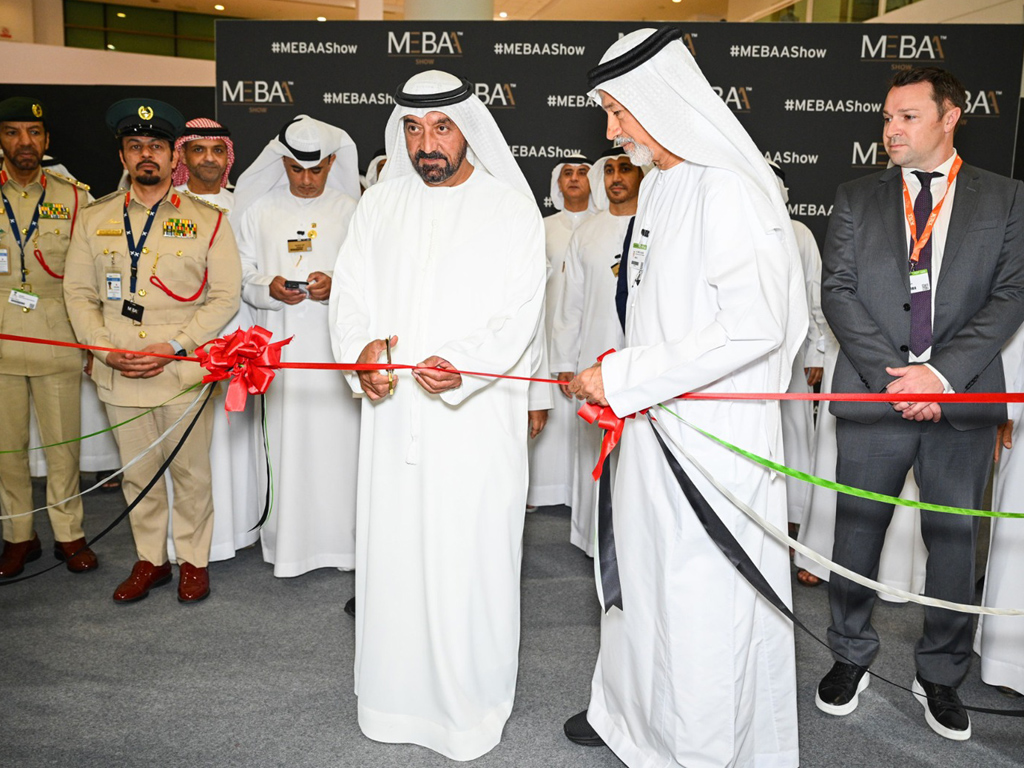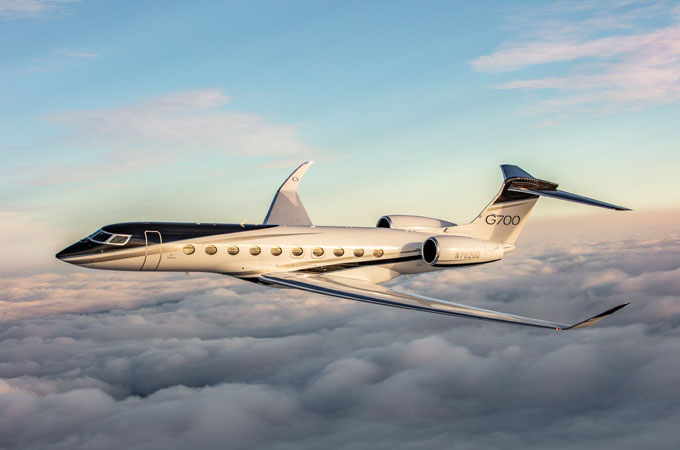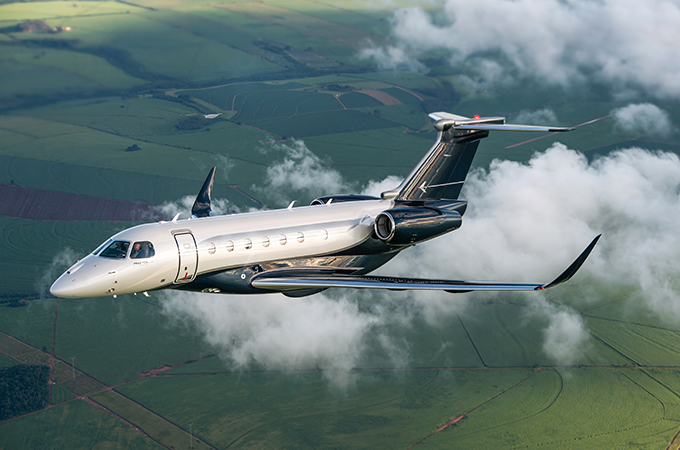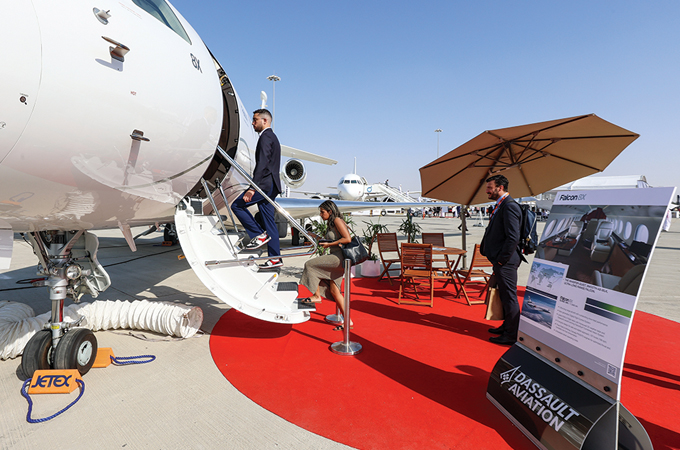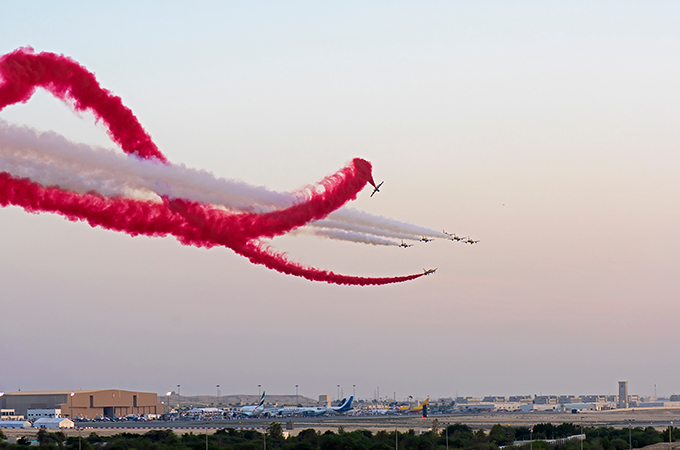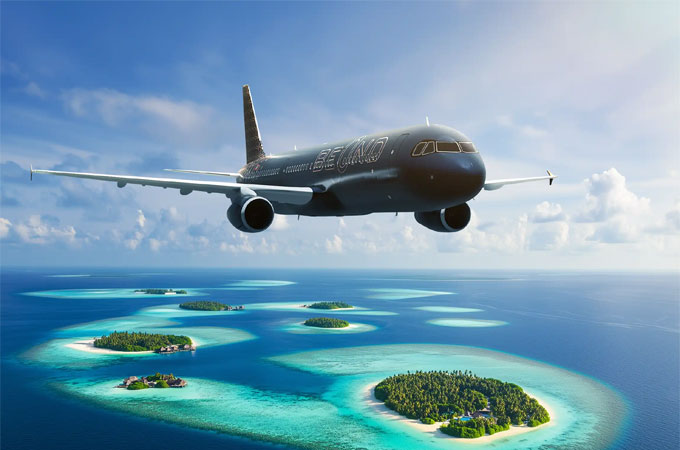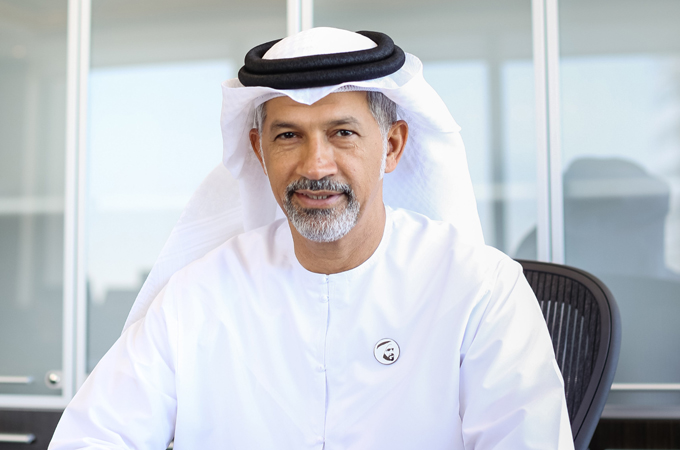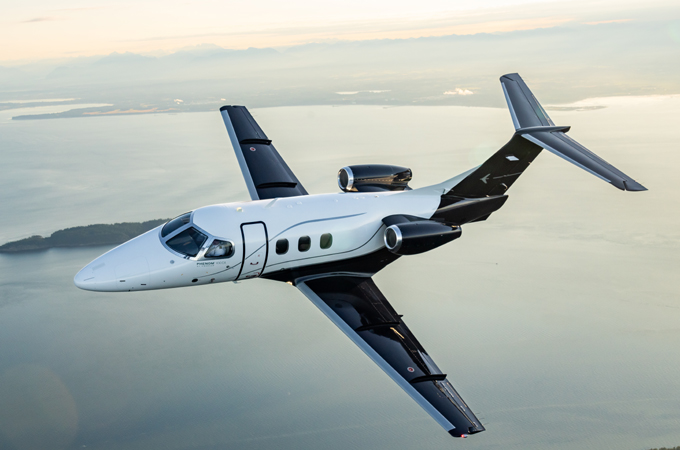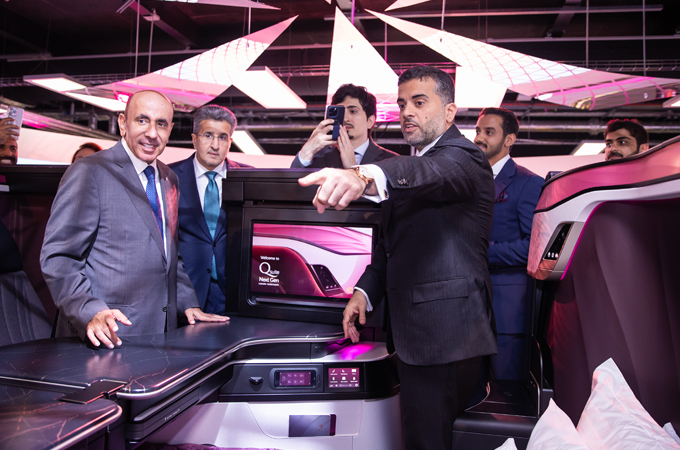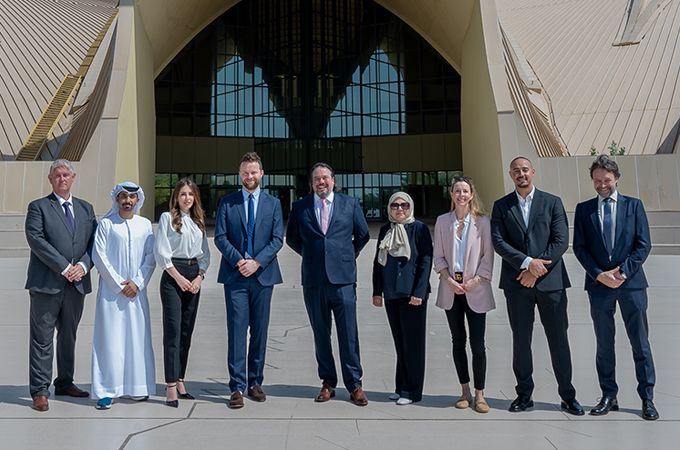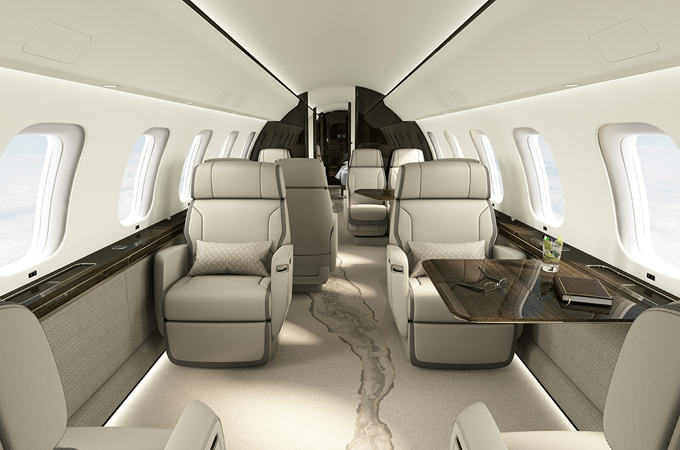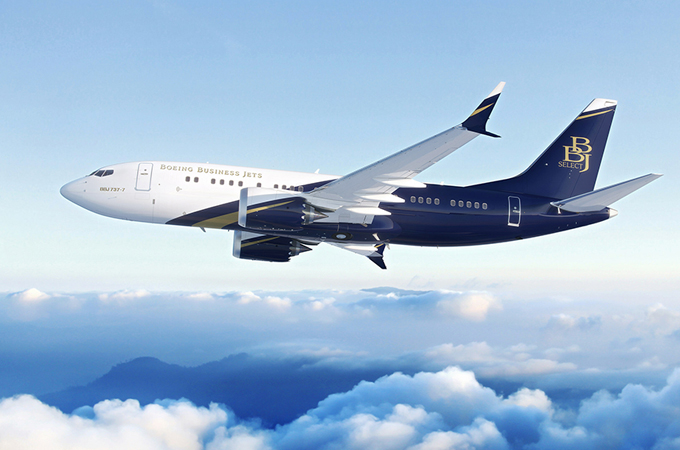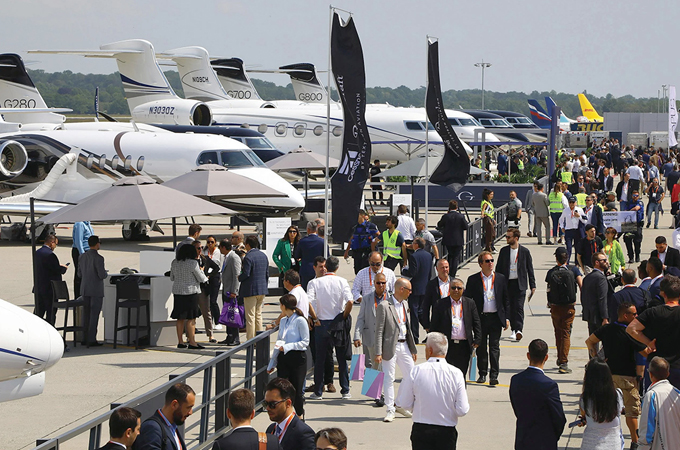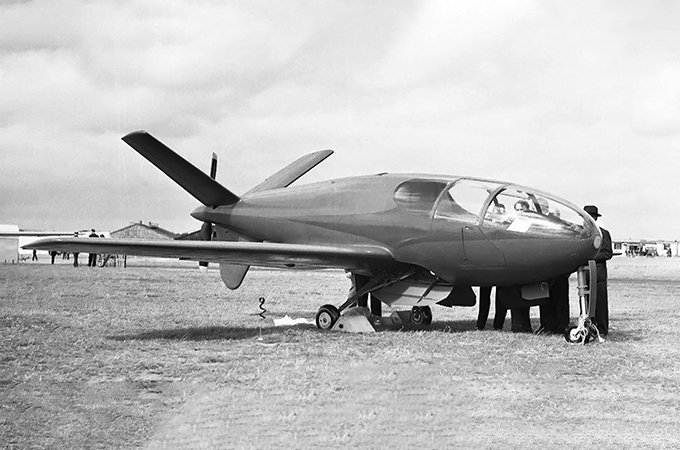Winter 2016
Lufthansa Technik works closely with its customers to deliver the most complex completions projects, while responding to new trends in cabin layout and design
Walter Heerdt is Senior Vice President of Lufthansa VIP and Executive Jets Solutions and has been in the job for about 18 months. Personable and focused, his background in both aerodynamics and aircraft engines coupled with a passion for meeting any and all of the challenges that present themselves to Lufthansa Technik are in his words “what makes me get out of bed in the morning”.
The German company is a giant in the market of post-build fitting out, conversion and maintenance of commercial and business jet aircraft. It also has a wide range of specialist services beyond customisation. Unlike a traditional giant, it is also flexible and nimble, able to respond rapidly in an emergency and draw on a bank of experience second to none.
“We responded to an urgent request from the German government to fit out an evacuation aircraft to respond to the Ebola crisis,” he says. “We provided that challenging conversion at very short notice. Fortunately it did not need to be used.”
At the 2015 Dubai Airshow, Lufthansa Technik marked its presence with a Boeing 747-8 on show that was customised in a style that the company has become famous for and addresses the market sector that it feels very comfortable in.
“We delivered the first 747-8 in September 2015 and there is a second one due to be delivered soon. These are all private commissions with a very high level of elegance to truly top-end customers,” Heerdt tells Arabian Knight. “There is a third one in process which is due for delivery next year; so by the end of 2016, we will be the only completions centre having completed three 747-8s.”
The first two are both for government customers, specified to the highest level of elegance and sophistication. The parameters of the fitting-out customisation included the lowest level of noise, highest level of communication, and the best level of entertainment and comfort.
“We also have new advanced technology and some new features in there, but we cannot and would not disclose these confidential details,” Heerdt says, adding that these aircraft will, however, each fly for the highest-ranking individuals in three states.
Lufthansa Technik is very well aware that there is a market for 747-8s and that it has truly developed as the competence centre for B747-8 conversions. “Our parent company Lufthansa AG operates 19 of these aircraft – so we know them extremely well. We also have extensive experience in maintenance and VIP systems – so we have a unique competence on all aspects of outfitting and complete maintenance of airframe and engines,” he says.
Lufthansa Technik and Royal Jet, the Middle East’s foremost private charter company, recently signed an agreement for the completion of two 737-700 BBJs. The two projects will be completed at Lufthansa Technik’s VIP and Executive Jet Solutions site in Hamburg, Germany.
“We will deliver these in late 2016,” says Heerdt. “These will be rather special conversions, very modern with a spectacular interior design.”
The VIP interior incorporates a private master bedroom together with a fully equipped master bathroom and a large lounge area, business and economy class areas as well as the latest telecommunications and entertainment technology. Each aircraft will comfortably accommodate 34 guests.
The skills and experience seen in the civilian and commercial market has been augmented by the wide spread of requests, of which the Ebola commission was one, from an array of organisations.
“We cover everything as long as it is a derivative of a civil commercial aircraft,” says Heerdt. “With special mission aircraft, we want to stay, as a matter of company policy, in an area where we do not touch weapon-carrying platforms. Medical, scientific and surveillance commissions along with multirole transport tenders and even zero-gravity planes (for space-simulation for astronauts) are all within our remit and capacity.”
Customisation and special commissions always bring challenges, but also have added to the vast and daily accumulating bank of experience and skills that Lufthansa Technik has garnered over the last 60 years.
SPECIFICATION IS KEY
The specification requirements for aircraft are unique to each customer. “Specification is everything – like a house – the main question being: what do you want to do with it?” says Heerdt. “There’s range, weight, the number of people you wish to fly, how much freight, together with style, all need to be taken into consideration. Is it to be an office, hotel, palace or perhaps medical facility?
He continues: “What we are seeing is that range and noise and, importantly, comfort are key issues. Customers use these airplanes as both offices and hotels in which they can have a comfortable journey, a shower, good rest and entertainment. When they arrive they want to be relaxed and ready for work next day.
“Then it is important to select the right plane – in the private and commercial areas we have, over the years, developed a great experience bank. Customers come to us and ask for our recommendations. However, we remain neutral consultants, here to assist customers and guided by the aircraft’s mission profile.
“For large jets, wide bodies, 747s and so on, range is not a major issue. It is more so for the narrow-bodied jets. The mission profile for these is even more important, with range being among highest priorities. “There is always a trade off – for example, you wish to go from Hamburg to Buenos Aires, one has to think of what aircraft is right, and what the payload will be.”
“Some areas that we have developed – for example, suppression of general internal noise levels – are what we have learned from our customisation, and these could be applied to commercial aircraft,” observes Heerdt.
There are other spin-offs that eventually surface in the commercial arena. The requirements specified by customers are usually to the highest standards, and devising ways to meet them informs the development of commercial systems. Among these are cabin illumination, the ‘latest and greatest’ entertainment systems, including live TV, internet and sophisticated communication systems.
Heerdt says that in early 2016, Lufthansa Technik will install Ka-band satellite communication technology into several VIP aircraft. The new technology would enable VIP passengers to use the full spectrum of cabin applications such as e-mail, internet, access to VPN networks, voice capabilities, video conferencing, cloud computing and e-commerce.
“We responded to the continuously increasing demands for high-performance in-flight connectivity and this will outperform current technologies in terms of speed, bandwidth and coverage,” he says. “We will be certificated to do this for the Airbus A330/A340 family and the Boeing 737.”
Moreover, environmental concerns are always an element within Lufthansa’s design mix. The all-up weight and trimming of an aircraft has a lot to do with range, speed and therefore fuel consumption.
“In completions we focus on the interior, and weight is a major concern as it has an effect on emissions,” says Heerdt. “Besides the reduction of operating costs, this reduces environmental burdens.”
Lufthansa Technik has a long and ongoing history in development and use of environment-friendly solutions that include timely repairs and green cleaning processes.
Heerdt studied mechanical engineering and aerodynamics and was for a long time in the engine business and has contributed his vast experience to maintenance and extending the lifetime of engine parts, by not always replacing, but instead developing repairs.
“Finding ways to increase the efficiency of compressors to reduce fuel consumption, using environment-friendly methods to clean parts and other such measures individually might not seem to be much but cumulatively and over time they all make a significant difference in reducing costs, waste and protecting the environment,” he says. “All these measures ensure that the aircraft don’t consume more fuel than necessary and run efficiently. Besides protecting the environment, it makes good economic sense.”
CLIENT BASE
Lufthansa Technik’s business arena is worldwide, according to Heerdt. “We have worked on several private planes for clients across the US, Europe, and Asia as well as China and Russia – but traditionally the Middle East is the biggest market.”
Heerdt also notes that the completions market has been affected by the current world economic climate. “This is presently influencing ordering decisions,” he says.
Lufthansa Technik’s services – which extend into servicing and maintenance contracts for commercial airlines as well as delivering personalised aircraft – were given a considerable boost during the 2015 Dubai Airshow with Saudia Aerospace Engineering Industries (SAEI), the aircraft maintenance arm of Saudi Arabian Airlines (Saudia), signing an agreement with Lufthansa Technik to enter into a strategic partnership.
Under the agreement, Lufthansa Technik will support SAEI with aircraft component maintenance for Saudia’s A320 and A330 fleet and assist it to develop the maintenance, repair and overhaul (MRO) capabilities for Airbus and Boeing aircraft at its facilities in Jeddah, Saudi Arabia.
In return, Lufthansa Technik will use SAEI as a subcontractor for those parts SAEI already holds. The partners also intend to jointly market their combined capacities to third-party customers in the region.
There has, however, been a distinct shift, Heerdt feels, in the client profile for the private and business jet market over the last few years. The traditional market was for high-end widebodies, and Heerdt is sure that they would still be a substantial sector in the future. “However, what we are also seeing is a market for smaller airplanes,” he says. “The younger generation seems to be interested, but still want very high levels of comfort even in these smaller jets. People are beginning to look for more modern designs, not so much traditional designs.”
There is, he feels, a particular emphasis on the provision of instant communications and entertainment. The interior décor for these customers has moved away from the traditional ‘fully loaded’ sumptuous house or club style, to a simpler but comfortable and luxurious style.
“We have now modular designs we can use in various planes, that enables us to produce them less expensively and in a shorter time.”
Evidence of this surfaced last May at the Ebace show in Geneva, Switzerland, where Mercedes-Benz Style and Lufthansa Technik revealed a co-operation project for the design of an innovative, luxurious and integrated VIP cabin concept.
Buoyed by the large level of interest shown by the VIP market for the Mercedes-Benz Style VIP cabin, the new design was introduced to customers at the Dubai Airshow.
Heerdt says that the floorplan visualises typical Mercedes-Benz modern luxury combined with Lufthansa Technik’s highest quality design approach.
“The result is a unique, organic and functional design for a modern VIP jet. Together with Lufthansa Technik’s latest in-flight communication and entertainment innovations, the new cabin will be ideal for global players wishing to travel in style,” he says, adding that the “organic and homogeneous” design all but eliminates any separation between ceiling, wall and floor, instead allowing the aircraft’s structures to “flow into each other”.
The VIP aircraft, which could seat 150 passengers in airline configuration, is designed for 16 passengers. Mercedes S-Class influences are revealed in the touchscreen windows, plush wraparound sofas, hardwood floors and clean uncluttered lines.
“It demonstrates a paradigm shift in tastes and I think there will be more of this around. However, I am sure that the other market will not disappear,” says Heerdt, adding that the new trend may not be limited to narrow-bodied jets but also include wide-bodied planes.
Heerdt says that this shift also heralds the emergence of a new generation of buyers. “We are seeing continuity into a second generation of clients – private, corporate and governmental – and importantly, it is all based on trust.”
With 60 years of constancy and reliability as a track record, that trust is well founded.



